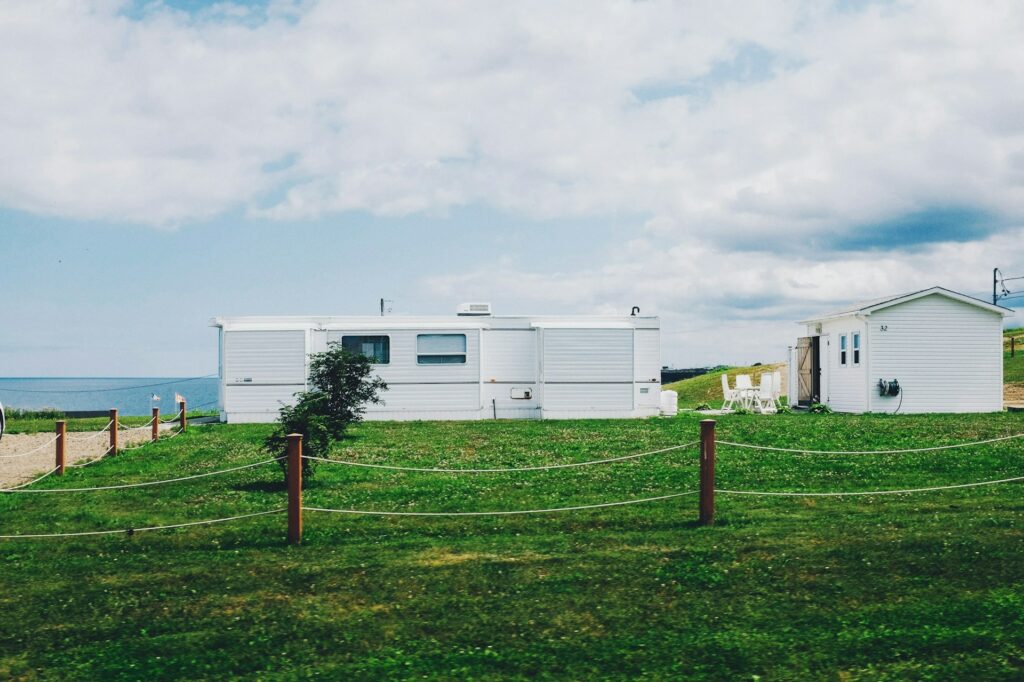Improving energy efficiency in your mobile home is essential for reducing utility bills and maintaining year-round comfort. Due to construction methods and materials, mobile homes, especially older models, can be less energy-efficient than traditional houses. However, with the right upgrades and adjustments, you can significantly improve energy performance.
This guide outlines practical steps on how to improve energy efficiency in your mobile home. Learn actionable steps that will help you save on utility costs while creating a more comfortable and sustainable living environment.
Upgrade Insulation
Insulation is the foundation of energy-efficient manufactured homes. It prevents winter heat loss and reduces summer heat gain. However, many mobile homes, particularly older ones, have insufficient insulation.
- Walls and Ceilings: Add fiberglass or foam board insulation to your walls and ceilings to improve thermal performance.
- Windows and Doors: Unlike traditional insulation, adding thermal or foam-backed curtains and insulating around window and door frames with spray foam or weather stripping helps improve energy efficiency.
- Floor Insulation: Install insulation under your floors to prevent cold air from seeping in.
- Roof or Roof Cavity: If your mobile home has an attic or roof cavity, insulating this space prevents heat from escaping through the top of the structure.
- Ductwork: Insulating your HVAC ductwork reduces heat loss during winter and prevents cool air loss in summer, improving overall system efficiency.
For newer mobile homes, check the insulation’s R-value to ensure it meets modern energy standards. The R-value measures an insulation material’s ability to resist heat flow. Higher values indicate better insulating effectiveness. In addition, make sure to order high-quality solutions from reputable suppliers.
Seal Air Leaks
Air leaks are a significant source of energy loss in mobile homes. These small gaps around doors, windows, and vents let the conditioned air escape, allowing drafts to enter.
- Inspect Common Leak Points: Check windows, doorframes, plumbing openings, and ductwork for cracks or gaps.
- Use Weather Stripping and Caulking: Seal gaps around doors and windows with weather stripping or caulk. For larger openings, use expanding foam.
- Install Draft Stoppers: Add draft stoppers at the base of exterior doors for extra protection.
- Utility Connections: Gaps around utility penetrations, such as where cables, gas lines, or water pipes enter the home, can allow air to leak in or out. Seal these openings with expanding foam or caulk.
- Electrical Outlets and Switch Plates: Air can seep through gaps around electrical outlets and switch plates on exterior walls. Seal these areas with foam gaskets or outlet covers.
Here’s an additional tip for locating air leaks. Conduct a smoke test by holding a lit incense stick near suspected leak areas. If the smoke wavers, you’ve found a draft.
Upgrade to Energy-Efficient Windows and Doors
Older windows and doors can be a major source of energy loss. Replacing them with modern, energy-efficient options can make a noticeable difference.
- Install Double-Pane or Low-E Windows: Double-pane windows have two layers of glass with a gas-filled space for insulation, while Low-E coatings reflect heat, reducing energy loss and maintaining indoor temperatures. These windows offer better insulation and help reduce heat transfer.
- Upgrade Exterior Doors: Choose insulated doors designed for energy efficiency. Insulated exterior doors are built with materials that minimize heat transfer, providing better energy efficiency and improved comfort by keeping out cold drafts and retaining indoor warmth.
- Add Storm Windows and Doors: Storm windows and doors provide an additional barrier against heat loss and drafts. They act as a secondary barrier, creating an insulating air pocket that reduces heat loss and prevents drafts.
Improve HVAC Efficiency
Your heating and cooling system can account for much of your energy use. It is also the cheapest way to heat a mobile home.
- Service Your HVAC System Regularly: Schedule professional maintenance to keep your system running efficiently.
- Replace Air Filters: Clean or replace filters monthly to improve airflow and reduce strain on the system. Follow the scheduled replacement as indicated in the user’s manual.
- Seal Ductwork: Leaky ducts waste conditioned air. Seal any gaps with metal tape or mastic sealant.
- Upgrade to an Energy-Efficient Unit: If your HVAC system is outdated, consider upgrading to a high-efficiency model.
You can also opt to install a programmable thermostat. They allow you to better control your heating and cooling schedule.
Optimize Your Lighting
Switching to better lighting options is a simple yet effective way to cut costs in energy-efficient mobile homes. Modern lighting solutions provide brighter, longer-lasting illumination while significantly reducing your environmental footprint.
- Use LED Bulbs: LED lights use up to 75% less energy and last significantly longer than incandescent bulbs.
- Install Motion Sensors or Timers: These can prevent lights from staying on unnecessarily.
- Maximize Natural Light: Use lighter curtains or blinds during the day to let sunlight illuminate your home.
Add Reflective Roof Coatings
Reflective roof coatings help deflect sunlight, reducing heat absorption during summer months. These coatings are particularly effective on metal or rubber roofs, reflecting UV rays to keep indoor temperatures cooler and reduce air conditioning costs.
- Benefits: Reflective coatings lower indoor temperatures, reducing the need for air conditioning.
- Application: These coatings can be applied to metal or rubber roofs for added energy savings.
- Bonus Tip: Check with professionals to ensure your roof is suitable for a reflective coating.
Install Energy-Efficient Appliances
Older appliances tend to consume more energy than their modern counterparts. Here are more options for better mobile home energy:
- Upgrade to ENERGY STAR® Appliances: For improved efficiency, look for refrigerators, washers, and dryers with the ENERGY STAR® label.
- Replace Water Heaters: Install a tankless or high-efficiency water heater to reduce energy use.
- Use Smart Power Strips: These strips prevent electronics from drawing power when they’re not in use.
Improve Skirting Ventilation
While insulated skirting helps retain heat, proper ventilation is also crucial to prevent moisture buildup.
- Install Vents Strategically: Ensure adequate airflow under your home to reduce the risk of mold or rot.
- Close Vents Seasonally: Close skirting vents during winter to retain heat and reopen them in warmer months.
Harness Renewable Energy
Incorporating renewable energy solutions is a smart way to achieve long-term energy efficiency and reduce environmental impact. Leveraging sustainable technologies like solar power can significantly lower utility costs while increasing your home’s energy independence.
- Install Solar Panels: Solar power can reduce reliance on grid electricity. Panels can power appliances or heating systems.
- Use Solar Heaters: Solar water heaters are an eco-friendly way to reduce energy costs.
- Money Saving Tip: Check for local incentives or rebates for installing renewable energy systems.
Build Energy-Smart Habits
Improving energy efficiency isn’t just about upgrades. It’s also about adopting energy-conscious habits. Here are a few suggestions that homeowners should adopt:
- Unplug Devices: Turn off or unplug electronics when not in use to avoid phantom power draw.
- Adjust Thermostat Settings: Lower the thermostat by a few degrees in winter and raise it in summer to save energy.
- Use Fans Strategically: Ceiling fans can help circulate warm air in winter and cool air in summer.
Use Top-Notch Components to Boost Your Home’s Energy Efficiency
Improving energy efficiency in your mobile home doesn’t have to be overwhelming or expensive. Small upgrades, like sealing air leaks or switching to LED bulbs, can make a big difference, while larger investments, such as insulation and energy-efficient windows, provide long-term savings.
For high-quality materials for your mobile home’s skirting, insulation, and other energy-saving solutions, trust Basic Components as your reliable supplier. Contact our specialists today for expert tips and advice.


